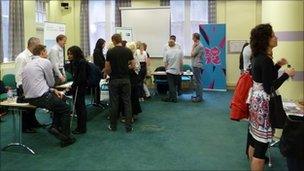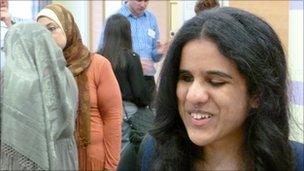Career coach to help young and blind develop job skills
- Published

The UK has almost 2m blind and partially sighted people. About 66% are not in paid employment
It cannot be easy being young and out of work in the current economic climate. How much more difficult is it when you are also blind or visually impaired?
According to the Office for National Statistics (ONS) nearly 20% of 16 to 24-year-olds are currently out of work.
To put that in some perspective, around 70% of a similar age group of blind or partially sighted people are out of paid employment.
A new scheme, Career Coach, aims to help blind and visually impaired people from the Greater London area receive careers advice, develop their employment skills and give them a boost up the jobs ladder.
"We did a lot of research and found that blind and partially sighted people are unlikely to receive really good careers advice or gain work experience that would help them to get work," said Lauren Finnegan, Action for Blind People's Employer Engagement Officer, who is running Career Coach.
It was found that mainstream careers advisors are unsure of the type of jobs that someone with restricted vision could do and that it was difficult to convince employers to take on a blind or partially sighted young person.
There were also practical difficulties. For example, most careers fairs are held in busy, loud and large halls, which can be difficult for someone with a visual impairment.
Safe and accessible
Career Coach attempts to overcome these hurdles.
Held at the Royal National Institute of Blind People (RNIB) offices in central London, it is a safe and accessible environment for people with sight loss.

Harshadha says Career Coach has given her an idea of what she can do in the future
Trained counsellors are on hand to give advice on interview skills, career options and help with job applications in one-to-one sessions.
Several high-profile employers, such as BT, Boots and London 2012 were also in attendance to talk to the young people, and in some cases, offer work placements.
Harshadha Balasubrananian, 16, of Brent in North London, has just finished her GCSEs and hopes to go on to university and eventually pursue a legal career. She is also blind.
"This, for me, is to get an idea of what's out there and what are some of the things that might hinder my progress into the jobs market," she says of Career Coach.
"You've got some employers who are really open-minded and they don't see your visual impairment. Other employers think that visual impairment does hinder things. Being here and talking to all these people gives me an idea of what I can do."
Another young person hoping to benefit from Career Coach is Ben Breen, 17, from Gravesend in Kent.
Currently studying for an International Baccalaureate, Ben has already had some work experience in music production and hopes to eventually find employment in that field or in IT.
Ben said: "My school does do careers advice but it's not brilliant because they don't focus on the possibilities for visually impaired people. This is more specialised and tailored. Here you've got a variety of different people from different companies that you can talk to."
A common complaint from blind and visually impaired people is that they are unsure where to look for jobs that are suitable for them.
Diversity is good
Ben says Careers Coach solves that problem because the companies that are here, have already factored in accessibility issues.
One of those companies is the technology giant, Cisco. Dave Thomson is one of their marketing managers and co-lead of their European Disabilities and Awareness Network.
"Inclusion and diversity is part of Cisco's core culture," he said.
"We're not doing this for the sake of looking good. There's no doubt that diversity is good for the business. It makes for better products and better creativity."
"We do everything from designing, developing, selling and supporting products. There's also all the back office functions. So there's probably an opportunity somewhere to help them navigate around a big machine like Cisco."
Around 30 blind and partially sighted young people from London and the south east are expected to attend the Career Coach event. It is hoped that the concept can be rolled nationwide.
"We want to get the message out there," says organiser Lauren Finnegan.
"That the blind or partially sighted person who is coping, struggling or just carrying on as usual through their education knows that there is a light at the end of the tunnel. We are here to help them into employment."
- Published17 May 2011
- Published6 July 2011
- Published17 June 2011